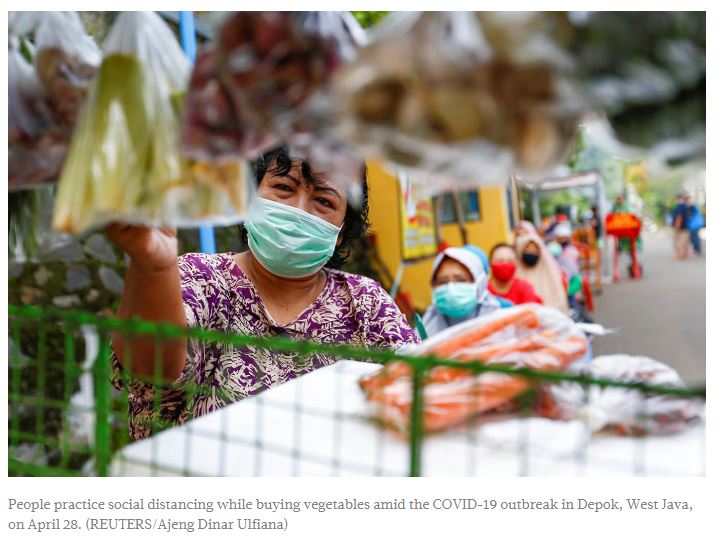Indonesia: Inflation drops further in July, sustaining decades-low downward trend
The downward trend in the annual inflation rate continued in July, the lowest since 2000, as the COVID-19 pandemic ravages people’s purchasing power.
Statistics Indonesia’s (BPS) consumer price index (CPI) was up by 1.54 percent year-on-year (yoy) in July, below Bank Indonesia’s (BI) target range of between 2 and 4 percent for the year. It was also lower than June’s annual inflation rate of 1.96 percent.
Meanwhile, the core annual inflation rate stood at 2.07 percent, as government-administered prices were up 0.70 percent and volatile prices only rose by 0.35 percent yoy.
“The core inflation was still weak despite a slight [monthly] increase in July, which suggests that we still have to work hard to boost people’s purchasing power,” BPS head Suhariyanto said in a virtual briefing on Monday.
The government gradually restarted economic activities in July to accelerate the recovery of the country’s economy, which has been badly hit by the pandemic. It has also earmarked Rp 695.2 trillion (US$47.2 billion) in stimulus measures to strengthen the country’s healthcare response and boost the economy amid the ongoing health crisis.
However, the government expects the country’s gross domestic product (GDP) to have contracted by 3.8 percent in the second quarter and possibly shrinking further in the third, which would mark Indonesia’s first recession since the 1998 financial crisis.
On a month-to-month (mtm) basis, BPS recorded deflation of 0.10 percent in July.
“Based on expenditure, the deflation was largely caused by the falling prices of shallots, airfares, broiler chicken and garlic,” Suhariyanto said, adding that the rise in the prices of gold and eggs prevented further deflation.
Consumer prices for transportation and information, communications and financial services dropped the most in July, deflating by 0.71 percent and 0.31 percent, respectively. Meanwhile, personal care and other services, health and education rose the most by 6.05 percent, 4.2 percent and 2.66 percent, respectively.
Josua Pardede, an economist at Bank Permata, told The Jakarta Post on Monday that the downward trend in inflation was in line with the decision of many Indonesians to halt spending especially on secondary and tertiary needs due to the massive layoffs and furloughs.
More than 3.06 million Indonesians had either been laid-off or furloughed as of May 27, according to Manpower Ministry data. The government expects up to 5.5 million of the country’s workforce to lose their jobs this year amid the pandemic impact.
The low inflation also allows room for BI to further lower the benchmark interest rate for the fifth time this year, after it slashed the interest rate by 25 basis points to 4 percent last month, the lowest since 2016.
However, Josua suggested the central bank should stick with the current interest rate to maintain rupiah stability and to assess the effectiveness of the existing monetary policies.
“It relates to the effort to shore up household spending. So, when economic activities return to normal, the impact of the interest rate [cuts] can take effect faster,” Josua said in a phone interview.
Andry Asmoro, an economist at state-owned Bank Mandiri, revised down his forecast for annual inflation to 2 percent from 2.69 percent at the end of the year given the low annual inflation figure in July.
Andry said on Monday in a statement that some government-administered prices, including transportation, would remain low because of the government’s social-distancing orders. Meanwhile, in regard to food prices, the government claims that it has secured food supplies that will last until the end of the year.
“Thus, there will be no meaningful pressure on volatile prices, particularly food prices,” said Andry.
Source: https://www.thejakartapost.com/news/2020/08/03/inflation-drops-further-in-july-sustaining-decades-low-downward-trend.html


 Thailand
Thailand




